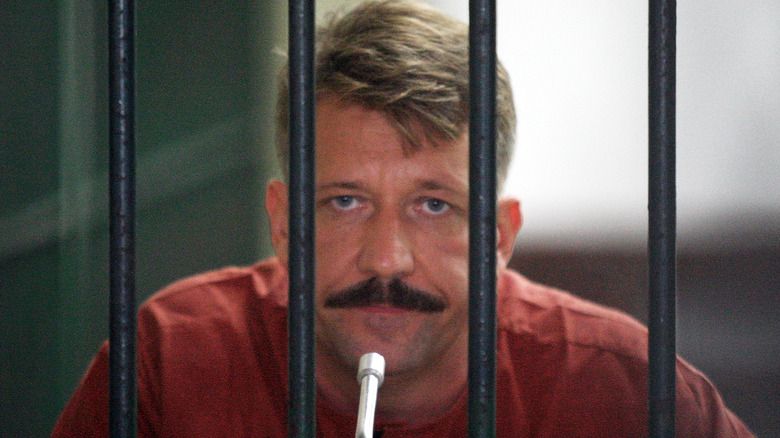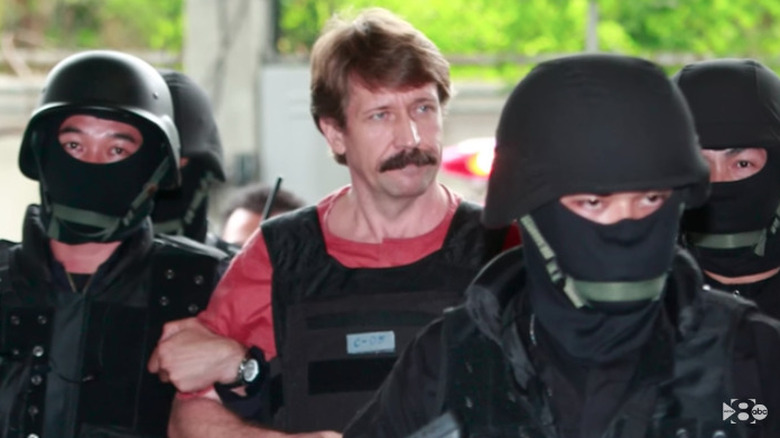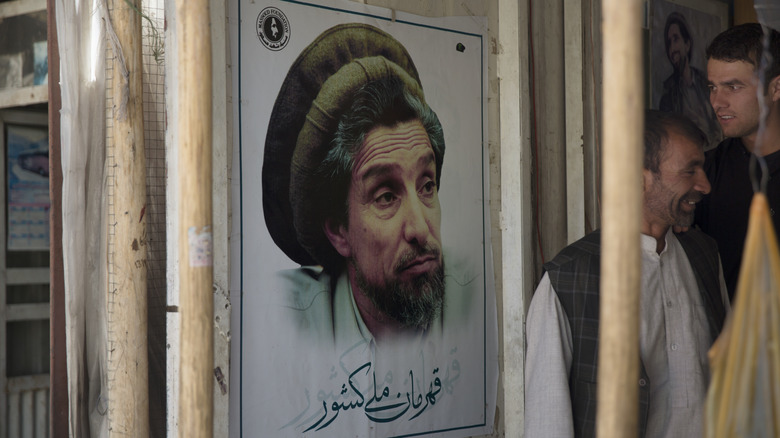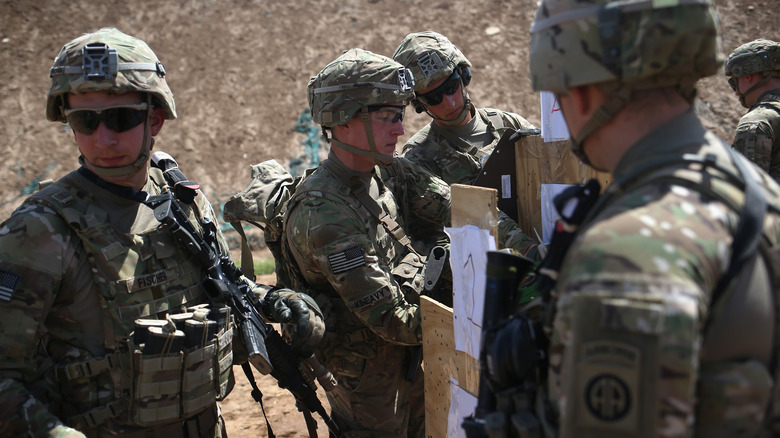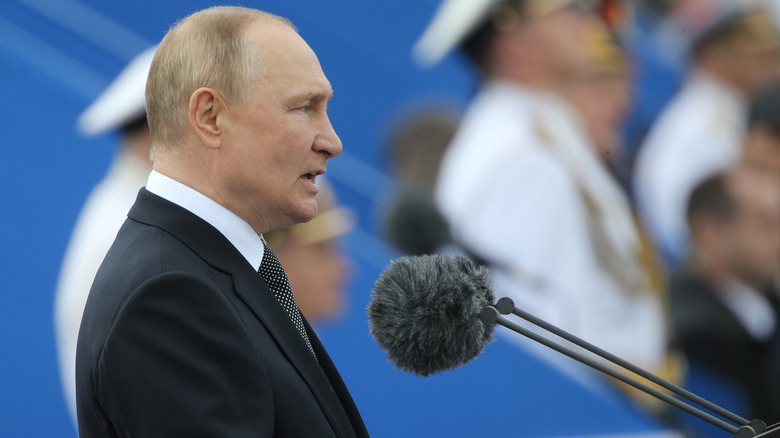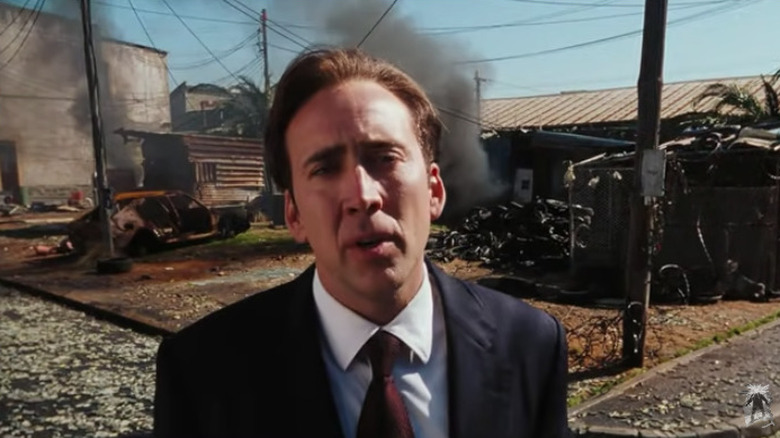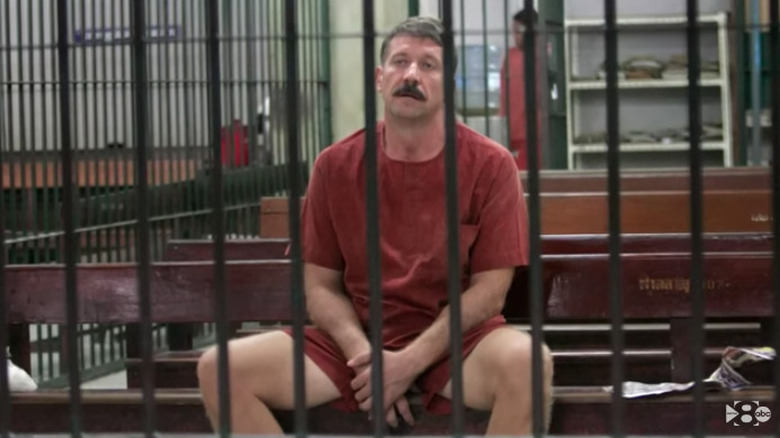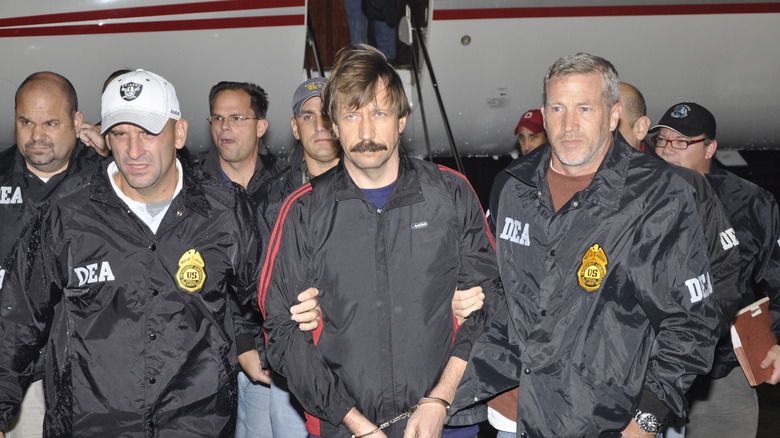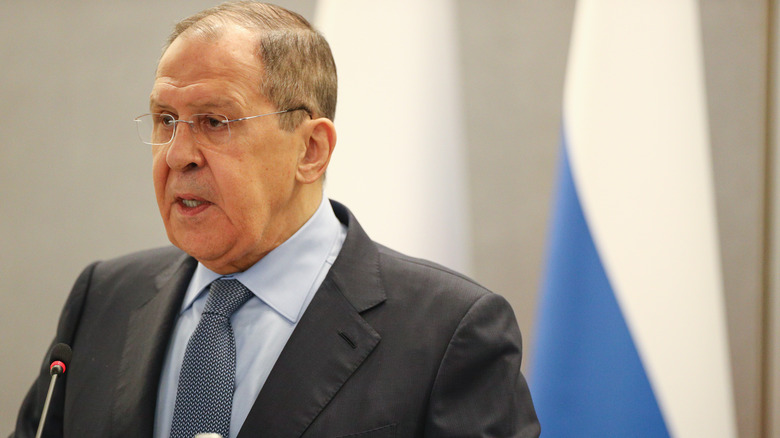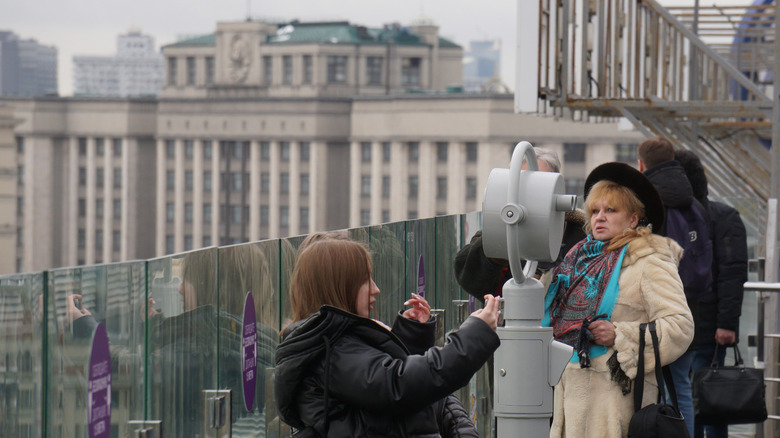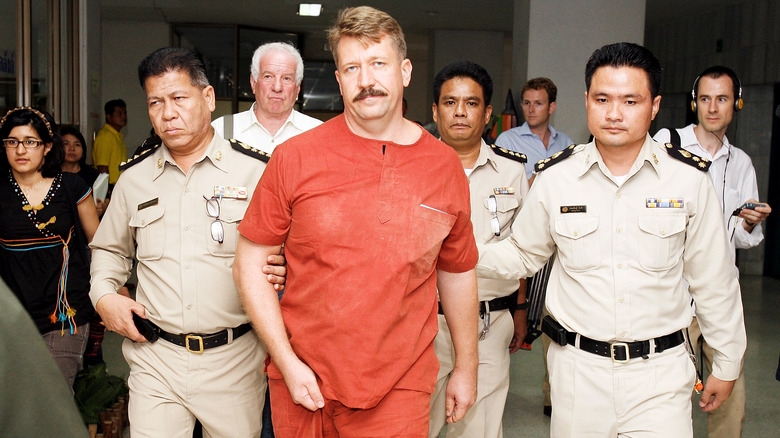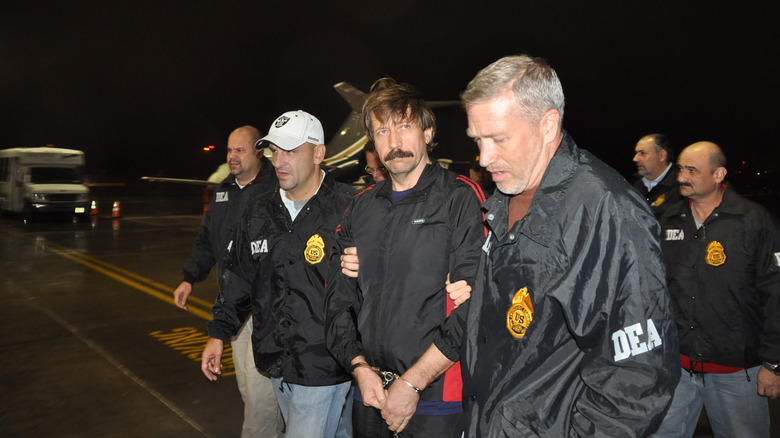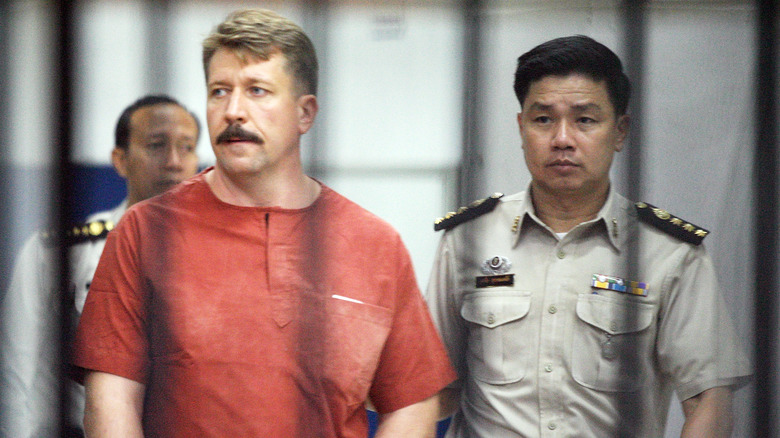The Untold Truth Of Viktor Bout
With the nickname "Merchant of Death," Viktor Bout can easily be confused for a spy thriller villain. Unfortunately for the rest of the world, he is very real and very dangerous — at least prior to his prison sentence. For years, Bout accelerated bloody wars and chaos in poverty-stricken countries through his arms dealing and trafficking. U.N. reports linked his arms trafficking to the wars in the Democratic Republic of Congo, Angola, and Afghanistan. His associates might've even been paid in those infamous "blood diamonds," per PBS. It was the U.K Foreign Minister Peter Hain who called Bout "Africa's chief merchant of death," coining the moniker that would stay with him for decades. Hain said the conflicts in Africa would not have been as devastating without the weapons Bout supplied, according to the Center for Public Integrity.
Bout was a nightmare for international legal authorities since he was elusive and cautious. He spent years safely protected in Russia while several countries hunted him down, until he was ultimately arrested by U.S. authorities in 2008. But his sentence may in 2022 if he's swapped for two Americans being held in Russia — WNBA star Britteny Griner and retired Marine Paul Whelan.
Although Bout hasn't been confirmed as part of the negotiations between the U.S. and Russia, his name has become a clear, but risky option, per NPR. Read on to learn why that may be a dangerous decision.
Viktor Bout first worked as a military translator
It seems as though Viktor Bout has a natural gift for words and languages. In a 2003 interview with the New York Times, Bout said he spoke six languages fluently and learned most of them on the fly while living abroad. These languages include Russian, English, Portuguese, and the international language of Esperanto. He also said he could read in 15 or 16 languages and was proficient enough to haggle in nine or 10. After spending two years in the Soviet military, he enrolled in Moscow's Military Institute of Foreign Languages and studied Portuguese, per the New Yorker.
But Bout's time learning languages was not perhaps as innocuous as it sounds. The GRU, the Russian intelligence agency that outlasted the fall of the Soviet Union, was known to have targeted the Institute in order to discover and train future intelligence officers. Bout is said to have been one of them, although he's denied it. He was later tied to the KGB when he was working in Angola. Those connections made news, which he said made his mother emotional. The idea of Bout's being involved with the KGB made his mother cry, per New York Times. After Bout left the institute, he worked with the Soviet military at a Portuguese colony in Mozambique, where he met his wife, per the New Yorker.
The U.S. prioritized hunting him down alongside Osama bin Laden
The post-September 11 world saw U.S. intelligence focus its efforts on not only tracking down the terrorist mastermind Osama bin Laden, but the weapons trafficker responsible for arming various terrorist groups throughout the world — Viktor Bout. Although Bout and bin Laden were never officially connected, Bout had a history of supplying ammunition to the Taliban. The Taliban and al Qaeda were allies, and Bout's weapons likely were transferred between them. Since the Sept. 11 attacks, U.S. intelligence officials wondered how terrorist networks attained their weaponry, naturally leading them to Bout, per PBS. In 2003, Bout said that he woke after Sept. 11 to discover that he was among the most-wanted "second only to Osama," via the New York Times.
Bout's relationship with Afghan-based terrorist groups actually began with a more relatively innocuous relationship with the Afghanistan government and its defense minister, Ahmed Shah Massoud. In 1995, Bout's air freight company was shipping textiles and electronics to the country when Massoud, who was concerned about the growing Taliban threat, asked Bout if he could also ship guns. Months into that partnership, the Taliban shot down one of Bout's planes and held it captive. Bout met with the Taliban's leader and negotiated his crew's release, and effectively shifted his allegiance from the Afghan government to the Taliban, per the New Yorker. Although Bout denied making a deal with the Taliban, he later profited $50 million from weapons he sold to them.
The U.S. hired Viktor Bout while he was an international fugitive
The United States Department of Defense would probably like to sweep one unsavory fact in the whole Viktor Bout saga under the rug: it once used Bout's planes in its Iraq War efforts. In 2005, Assistant Defense Secretary Paul Wolfowitz admitted to Congress that the U.S. worked with companies who had done business with Bout. A book about Bout's escapades, "Merchant of Death: Money, Guns, Plans, and the Man Who Makes War Possible," made even bolder claims (via ABC News). U.S. government contractors paid Bout's air cargo companies $60 million in taxpayer money to fly military supplies to Iraq and gave his pilots 500,000 gallons of free fuel. The partnership occurred between 2003 and 2005 over the course of 1,000 trips. However, one of the authors, journalist Douglas Farah, said that the United States contracted Bout as late as 2007, two years after Wolfowitz's revelation and one year after Bout armed Hezbollah and Somali warlords.
The Defense Department learned of the transaction in 2005 after discovering the names of several companies Bout owned and typing them into their own database. At the time, Bout's planes were transporting tents and rations to American troops, per the New Yorker. When asked about these findings, Bout said his possible connection to the U.S. military was "very funny." He admitted that his planes could have transported American cargo without his knowledge.
He's been linked to the KGB and Putin himself
Ever since Viktor Bout's name was linked to a possible prisoner swap, people have been wondering: why does the Kremlin want him so badly? One prevailing answer is that he is merely "one of them." According to journalist Jill Dougherty, Bout's highly successful and efficiently engineered air cargo business, which rose in the early aftermath of the Soviet Union's fall, could only have been possible with help from the KGB. Not only was help from the top necessary to establish such a well-connected and financially viable business at that point in Russian history, but he needed KGB contacts to put him on the map in conflict zones, like the Congo and Afghanistan (via CNN).
Of course, Bout has denied such connections. He's been tied to the KGB since 1991 while working in Angola after the Soviet Union dissolved. He showed a New York Times reporter a statement from the KGB's successor, the Federal Security Services, stating there were no known connections between the intelligence agency and Bout. But he also didn't have an answer as to how he obtained start-up funds for his business when he was only 25 years old, per the New York Times. And there was also that time when his associate told undercover DEA agents that Bout was protected by the upper rungs of the Kremlin and was "really close" with President Vladimir Putin, per the New Yorker.
Viktor Bout inspired a Nicolas Cage movie
In 2002, Viktor Bout downplayed the criminal charges brought against him by the U.S. government, saying he had done nothing wrong and that the accusations were akin to a "plot for a Hollywood action film" (via The Washington Post). Perhaps, Bout predicted that he would one day be portrayed by Nicolas Cage in a Hollywood film that many consider based on his life. For what it's worth, the "Lord of War" is fairly different from Bout's career. The movie is about a Ukrainian immigrant living in Brooklyn who begins an arms dealing business while pursued by an INTERPOL agent, played by Ethan Hawke, per HBO.
The movie became nearly relevant in Bout's own personal life when the jury forewoman from his trial was found to have given the film two thumbs down. Heather Hobson was brought in to speak to Judge Shira Scheindlin about her dislike for the movie, which she had seen several years before. She had to reassure Scheindlin and defense attorney Albert Dayan that she hadn't been influenced by the film when deciding her position. Her opinion on the Bout-inspired film had been captured in a previous New York Times article, which Dayan presented to the judge. Bout was convicted in 2011; the film was released in 2005, per the New York Times.
He was caught thanks to a sting operation
The year was 2007. It was five years after Viktor Bout first became an international fugitive, and something had to give. A team of DEA agents formed a plan in which undercover operatives and previous informants would disguise themselves as members of Colombia's terrorist rebel organization, FARC. The operatives planned to draw Bout out of his refuge in Russia and catch him on tape agreeing to send missiles for the purpose of killing American troops in Colombia. The plan would prove that Bout was still in business and would allow the agents to indict him for conspiring to kill Americans and supporting a terrorist group.
The operatives first spoke to one of Bout's retired associates, who then met with Bout in Moscow to discuss the deal. Bout first balked at working with drug dealers but was persuaded by FARC's political motives. Bout later told the operatives that he was also an enemy of the United States. After Bout and the operatives struggled to decide on a place that would work for both sides, they settled on Bangkok, Thailand. In a hotel room, Bout listed all the items that the FARC operatives said they needed. Just as they shook hands to close the deal, D.E.A. agents burst into the room and arrested Bout, according to the New Yorker.
The trial judge thought Viktor Bout's capture was unfair
Although prosecutors argued for a life sentence, Viktor Bout only received the mandatory minimum — 25 years in prison. The jury found him guilty on all counts, and sentencing guidelines suggested a life sentence. However, Judge Shira Sheindlin believed that the nature of his arrest, which was compelled by a sting operation, mitigated his punishment, per NBC News. Additionally, after spending 15 months in solitary confinement, Sheindlin approved of his removal. One of the prison's wardens said Bout posed a threat to guards, other prisoners, and himself, but Sheindlin disagreed. Reducing his status as a criminal to "a businessman," Sheindlin argued that Bout hadn't been involved in violent acts himself. Bout himself likely approved; he compared his stay in solitary confinement to perpetual torture, per the New Yorker.
Bout's lawyer was initially delighted by Sheindlin's attachment to the trial because of her tough-on-prosecutor approach. During the pretrial, she once implied that the D.E.A. agents that arrested Bout had lied under oath. She also agreed with Bout's claim that he had been threatened with mistreatment if he didn't cooperate with U.S. officials. Recently, Scheindlin said that Bout had served enough time to compensate for his charges after his name was floated in a prisoner swap. Although she says that the swap wouldn't be an even trade, since the Americans involved have relatively minor charges, she argued that Bout wasn't dealt a wholly fair hand since the DEA operatives "put words in his mouth," per AP.
Russia protested his imprisonment
Russia wasn't happy with America's imprisonment of Viktor Bout. After he was sentenced, Russia's foreign ministry promised to bring back Bout by any legal means necessary. It denounced Bout's conviction, calling it a "political order," calling his arrest illegal, and said the prosecution's evidence was unreliable. Foreign Minister Sergei Lavrov said in a statement to Russia's RIA Novosti news that he was going to discuss the sentence with then Secretary of State Hillary Clinton, adding that his mission wasn't revenge against the United States. Rather, Russia was interested in protecting Viktor Bout's rights and supporting the appeals process (via NBC News).
Bout's lawyer, Steve Zissou, has gone so far as to suggest that his client's arrest crossed a line in Russia-U.S. relations. He said that the United States government "lured" Bout into committing crimes and its targeting of him amounted to a direct attack on Russia's sovereignty (via the Washington Post). That might not sound so distant from Russia's own views, considering that the foreign ministry said that his release was one of their top priorities in Russia-U.S. relations, per NBC News.
Viktor Bout became an artist in prison — and an icon in Russia
In Russia, Viktor Bout is a martyr, wrongfully prosecuted by Americans. So, it's no surprise that he's become a celebrity in the country. In fact, many pieces of art he created in prison have gone on display in Moscow. Twenty-four of his artistic creations were housed in Moscow's Civics Chamber building in 2021. The works consist of paintings and drawings made using pencil, ballpoint pen, pastel, wax crayon, and oil paint. One drawing includes a self-portrait of Bout behind bars, another includes a baby ape kissing its parent, and a particularly dark drawing depicts a cat hanging from a tree by its neck with a chain. The chairman of the Civics Chamber Commission introduced the exhibition by saying that it represented the hope of Bout's soul for freedom.
Bout sent the artwork himself to Moscow via Russian diplomats while his wife, Alla, oversaw the exhibition and selection of paintings. She said the paintings were the only way Bout could communicate with the outside world, and she hoped that it would remind Russian politicians of Viktor's condition. Alla originally intended to display the paintings in Moscow's State Duma, but they refused. However, a deputy of the State Duma attended the opening and promised that Russia would not forget Viktor. The Civics Chamber agreed to display the work on the condition that the exhibition would last only three days, per The Art Newspaper.
He's appealed his sentence various times
After his sentencing, Viktor Bout fought back within legal means. He appealed the ruling in 2013, arguing that the prosecution was "vindictive." A three-judge panel rejected the appeal. He then decided to appeal again, only to withdraw it himself. According to his wife, Bout had given up on the U.S. judicial system and believed the judicial decisions would remain against him. He then fired his lawyer, per The Moscow Times. He later requested a new trial based on new evidence, but his trial judge, Shira Scheindlin, rejected it in 2015, saying the evidence could have been discovered during the trial and that it would not have changed the jury's ruling.
In 2016, Bout returned to the appeals court, arguing that the prosecutors' case against him no longer had grounds since his co-conspirator, Andrew Smulian, was found to have been an informant. Bout and his lawyer argued that this was new evidence, which had emerged during a documentary, and wanted the 2015 ruling overturned. But U.S. Attorney David Zhou shot the argument down, saying the evidence wasn't new and had been taken out of context, per Reuters.
Viktor Bout's associates were caught trying to smuggle again
You can judge a man by the company he keeps, and if there was any lingering doubt that Viktor Bout had violated international law, you only have to look at his partners-in-crime. While Bout was in prison, two of his former associates were found planning a new weapons trafficking ring. A U.N. report found that Sergei Denisenko and Andrei Kosolapov were very nearly close to using a U.S.-registered plane to fly arms transfers despite being under U.S. surveillance and sanctions. Their intended business destinations were conflict-ridden areas, including Sudan, Somalia, Iran, and possibly Syria. Denisenko was on the U.S. Special Designated Nationals List, which prohibited American companies from conducting business with him. He landed on the list because of his trafficking history in Liberia. Kosolapov was on the U.S. Visas Viper list, which tracks down known and suspected terrorists.
Denisenko and Kosolapov formerly worked with Bout in trafficking arms into several African conflict zones. But Bout's imprisonment wasn't going to dampen their sense of initiative. They took advantage of loopholes in the global arms trade through money laundering and shell companies to avoid detection, per The Guardian.
He has denied doing anything wrong
Viktor Bout's illustrious career precedes him, but he disagrees with what that means. Bout has maintained an alternate reality in which his business is nothing more than an air taxi. After receiving the status of an international fugitive with an arrest warrant placed on him, Bout told a Russian radio station in 2002 that he had nothing to be afraid of since he believed he hadn't committed a crime. He denied ever having shipped deadly weapons and said he only dealt with air transportation, per the Washington Post. He doubled down on his innocence when he was finally in custody in 2010 and awaited his trial in the United States. He said that on his extradition flight from Thailand, he was pressured to confess by U.S. authorities. Russia took these allegations seriously, while the spokesman for Russia's Foreign Ministry said that Bout had told him he had been under "professional psychological pressure," per CNN.
Most of all, Bout insisted he never did anything morally wrong. Even when allowing for the idea that he trafficked weapons during an interview with the New Yorker, he insisted it was only a few times. Most of the time, he claimed, his planes flew "normal shipments." He thought of his actions as unworthy of imprisonment, saying that he wasn't a criminal who shot and killed other people. He believed he was mostly targeted for being Russian.
